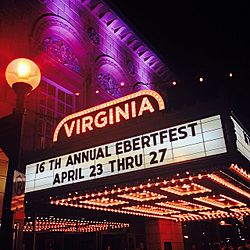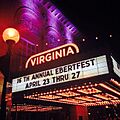Ebertfest facts for kids
Quick facts for kids Ebertfest |
|
|---|---|

A view of the Virginia Theatre's marquee in 2014 for Ebertfest
|
|
| Status | Active |
| Genre | Film festival |
| Frequency | Annually |
| Location(s) | Champaign, Illinois |
| Country | United States |
| Years active | 1999–present |
| Founder | Roger Ebert |
| Previous event | 21st Annual Ebertfest April 10–13, 2019 |
| Next event | 22nd Annual Ebertfest September 8–11, 2021 |
| Capacity | 1,463 (Virginia Theatre) |
| People | Roger Ebert Chaz Ebert |
Ebertfest is a special film festival that happens every April in Champaign, Illinois, USA. It's organized by the College of Media at the University of Illinois. This festival was started in 1999 by a famous movie critic named Roger Ebert. It was first called "Roger Ebert's Overlooked Film Festival." It's unique because it's the only long-running film festival created by a critic. Even after Roger Ebert passed away in 2013, the festival continues. It follows his ideas and vision for showing movies he believed in.
The festival in 2020 was canceled because of the coronavirus pandemic. The next one is planned for September 2021.
Contents
How Ebertfest Started
Ebertfest grew from a program at the University of Illinois in 1997. This program was called Cyberfest. It celebrated the supposed birthday of HAL, the computer from the movie 2001: A Space Odyssey. The event highlighted the university's role in computer history. 2001: A Space Odyssey was going to be shown. Roger Ebert agreed to host, and actor Gary Lockwood was a special guest.
Someone suggested showing the film in its original 70 mm format. This is a very high-quality film size. The university's performing arts center couldn't set up the special equipment in time. So, they looked at the Virginia Theatre. This old theater had shown 70 mm films before. Everyone was surprised to find that the theater still had a great 35/70 mm projector, screen, and speakers. Other equipment was brought in, and the special showing was a big success.
The Virginia Theatre: Ebertfest's Home
Since it began in 1999, Ebertfest has always been held at the Virginia Theatre. This beautiful old movie palace in Champaign was built in 1921. It is listed on the National Register of Historic Places, which means it's a very important historical building. The Champaign Park District now owns the theater. Roger Ebert often talked about watching movies at the Virginia Theatre when he was growing up in Champaign-Urbana. He also attended the university there. Ebert wanted all festival attendees to watch all the films in one theater. This helps create a feeling of community among movie lovers.
In 2014, a bronze statue of Roger Ebert was placed outside the Virginia Theatre. It's a tribute to both Ebert and the festival.
Theatre Improvements
Thanks to donations, the Virginia Theatre has greatly improved its projection and sound systems. It now has a second projector, the newest digital sound equipment, and top-quality lenses. A skilled projection expert from Chicago, James Bond, has been very helpful with these upgrades. He also works as one of the projectionists during the festival.
Seating at the Theatre
Since 2013, the Virginia Theatre can seat 1,463 people. The theater was closed from 2012 to April 2013 for renovations. All the seats were replaced. The number of seats went down a bit, from about 1,550 to 1,463. But the new seats are much more comfortable. The theater also offers easy access for wheelchairs and their companions.
Why the Name Changed
In April 2007, it was announced that the festival's name would change. Starting in 2008, with the tenth festival, the word "Overlooked" was removed. The event became known as "Roger Ebert's Film Festival," or simply Ebertfest. This change didn't mean the festival's main idea was different. It just made it easier to include newer films or even unreleased ones. Sometimes, these films were jokingly called "pre-overlooked."
How Films Are Chosen
Ebertfest is different from most film festivals. It does not accept film submissions from filmmakers. Roger Ebert himself chose the films for the festival. He picked movies that he thought were excellent but had not received enough attention. This could be from the public or from film companies. All films were chosen from those Ebert watched during his regular work as a critic. After Ebert passed away, a special Festival Committee now selects all the films.
The first goal of the "Overlooked Film Festival" was to show films that people, critics, or distributors had missed. Ebert happily admitted he could stretch the meaning of "overlooked." This allowed him to include any film he wanted. Sometimes, whole types of movies or film styles can be overlooked, not just single films. This idea of choosing films is expected to continue. The name change simply means there's no longer a need to find a reason to include every film.
Special Film Formats
Most years, the festival starts with a film in the 70 mm format. These films might be big releases, like 2001: A Space Odyssey or Patton. Or they might be less known, like the French film Playtime shown in 2005. These films were chosen mainly because they used the 70 mm process. Ebert felt this format was often overlooked.
Silent Films with Live Music
Each year, a silent film is shown with a live orchestra playing the music. The silent films chosen are usually well-known, like Nosferatu. But Ebert felt that most moviegoers overlook silent films in general. The festival also tries to include a musical film for the same reason. Groups like the Champaign-Urbana Symphony Orchestra and the Alloy Orchestra have played live music for these films.
How the Festival Works
Each festival usually shows 12 to 14 films. It starts with one film on a Wednesday night and ends with one movie the following Sunday. On the days in between, three or four films are shown. In 2019, there was no Sunday screening.
For the first eight festivals, Roger Ebert would introduce each film. After the movie, he would talk on stage with the filmmakers or others involved with the film. Sometimes, he would host a short group discussion.
After Ebert lost his speaking voice due to cancer, his wife Chaz took over many of the hosting duties. This started with the ninth festival in 2007. Discussions after the films are now led by his "Far-Flung Correspondents" or other respected film experts. These include film historian David Bordwell and film critic Christy Lemire.
Roger Ebert passed away on April 4, 2013, after a long fight with cancer. Despite his death, the film festival continued as planned. It also became a way to honor Ebert's amazing work. At the start of the 15th Ebertfest, Chaz Ebert announced something special. His alma mater, the University of Illinois at Urbana–Champaign, would start a new Film Studies program. This program honors his legacy. Ebert and his wife gave $1 million to the university to help fund it. This program will offer film-related classes and seminars. It will also help Ebertfest continue.
Festival Guests
Many film directors, actors, producers, and other movie crew members have been invited to Ebertfest. Some famous examples include Werner Herzog, Spike Lee, and Tilda Swinton.
In 2010, many international guests couldn't attend the tenth Ebertfest. This was because volcanic eruptions in Iceland stopped air travel in Europe.
Awards Given at Ebertfest
Ebertfest is not a competition, so it doesn't have jury or audience awards. But since the sixth festival in 2004, all invited guests receive a special award. Roger Ebert first called it the Order of the Silver Thumb. Later, it became known as the Golden Thumb Award. The Golden Thumb trophy is a copy of Roger Ebert's thumb in the up position. It's made by the R.S. Owens & Company, the same company that makes the Oscar statuette.
The first Roger Ebert Humanitarian Award was given in 2016. It went to co-directors Andrew Young and Stephen Apkon for their documentary Disturbing the Peace. This film is about Combatants for Peace. This group of former Israeli soldiers and Palestinian fighters decided to work together for peace.
In 2017, the second Ebert Humanitarian Award was given to Norman Lear. He received it for "a lifetime of empathy." Lear was the first person to get the award, as the 2016 award went to a film. Lear was a special guest at the 2017 festival. A documentary about his life was shown there.
In 2019, the third Ebert Humanitarian Award went to Morgan Neville for his film Won't You Be My Neighbor?.
Also in 2019, Chaz Ebert gave the first-ever Ebertfest Icon Award. It went to Rita Coburn Whack for her documentary about poet and civil rights activist Maya Angelou. The film was called Maya Angelou: And Still I Rise.
Film Discussions
The University of Illinois College of Media helps organize special discussions at every Ebertfest. These discussions include festival guests and university experts. They talk about many different film topics. These discussions are free and open to everyone. They are held in the mornings during the festival. From 1999 to 2016, the discussions were on the university campus. Starting in 2017, they are held in a hotel near the Virginia Theatre.
Watching Online
Since 2010, many parts of the festival have been streamed live online. This includes the discussions, film introductions, and Q&A sessions with guests. These videos are also saved on Ebertfest's YouTube channel.
Getting Tickets
People attending the festival can buy tickets for single shows or full-festival passes. Only 1,000 passes are sold. The remaining seats are for individual tickets or sponsors. Not all passholders attend every show. So, it's often possible to get tickets at the last minute if there are empty seats. Since 2002, everyone waiting in line for sold-out films has been able to get into the theater.
In 1999, passes for the first Ebertfest cost $30, and single tickets were $5. By 2016, passes cost $150, and individual tickets were $15. The passes first sold out in 2004.
Festival Leadership
- Festival founder, programmer, and host (1999–2012): Roger Ebert
- Festival producer (1999–2006): Nancy Casey
- Festival producer and host (2007–present): Chaz Ebert
- Festival director (1999–present): Nate Kohn
Images for kids
 | Anna J. Cooper |
 | Mary McLeod Bethune |
 | Lillie Mae Bradford |


